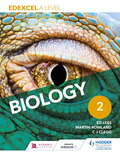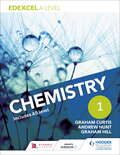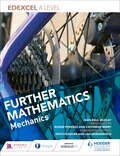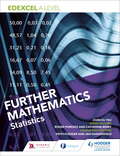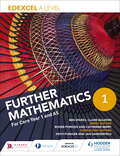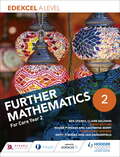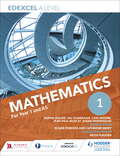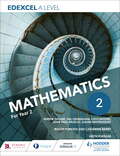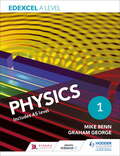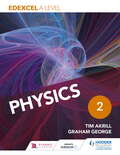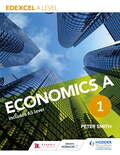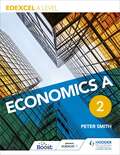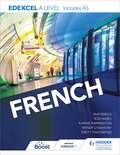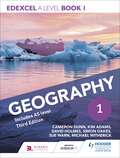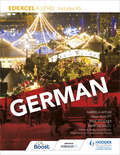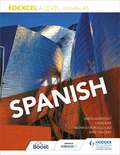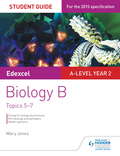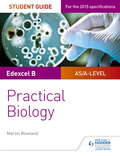- Table View
- List View
Edexcel A Level Biology Student Book 2
by Martin Rowland Ed Lees C. J. CleggExam Board: EdexcelLevel: AS/A-levelSubject: BiologyFirst Teaching: September 2015First Exam: June 2016Endorsed for Edexcel Supports Pearson Edexcel Level 3 Advanced GCE in Biology B (9BI0) specification.Build investigative skills, test understanding and apply biological theory to topical examples with this Edexcel Year 2 Student Book. - Supports all 16 required practicals with activities and questions to help students explain procedures, analyse data and evaluate results- Provides clear definitions, as well as explanations, of the meanings of all technical vocabulary needed for the new specification- Helps bring students up to speed with a summary of prior knowledge and diagnostic questions at the start of each chapter- Offers assessment guidance with Exam Practice Questions at the end of each chapter, graded by difficulty to support progression, along with Challenge Questions to stretch more able students- Mathematical skills throughout and a dedicated 'Maths in Biology' chapter explaining key concepts and methods- Develops understanding with free online access to Test yourself Answers and an Extended Glossary.
Edexcel A Level Chemistry Student Book 1
by Graham Hill Graham Curtis Andrew HuntExam Board: EdexcelLevel: AS/A-levelSubject: ChemistryFirst Teaching: September 2015First Exam: June 2016Endorsed by Edexcel Develop and assess your students' knowledge and mathematical skills throughout A Level with worked examples, practical assessment guidance and differentiated end of topic questions with this Edexcel Year 1 student book - Identifies the level of your students' understanding with diagnostic questions and a summary of prior knowledge at the start of the Year 1 Student Book- Provides support for all 16 required practicals with various activities and questions, along with a 'Practical' chapter covering procedural understanding and key ideas related to measurement- Mathematical skills are integrated throughout with plenty of worked examples, including notes on methods to help explain the strategies for solving each type of problem- Offers plenty of practice with Test Yourself Questions to help students assess their understanding and measure progress- Encourages further reading and study with short passages of extension material- Develops understanding with free online access to Test yourself Answers and an Extended Glossary.Edexcel A level Chemistry Year 1 Student Book includes AS level.
Edexcel A Level Chemistry Student Book 2
by Graham Hill Graham Curtis Andrew HuntExam Board: EdexcelLevel: AS/A-levelSubject: ChemistryFirst Teaching: September 2015First Exam: June 2017Develop and assess your students' knowledge and mathematical skills throughout A Level with worked examples, practical assessment guidance and differentiated end of topic questions with this Edexcel Year 2 student book. - Identifies the level of your students' understanding with diagnostic questions and a summary of prior knowledge at the start of the Year 1 Student Book.- Provides support for all 16 required practicals with various activities and questions, along with a 'Practical' chapter covering procedural understanding and key ideas related to measurement- Mathematical skills are integrated throughout with plenty of worked examples, including notes on methods to help explain the strategies for solving each type of problem- Offers plenty of practice with Test Yourself Questions to help students assess their understanding and measure progress- Encourages further reading and study with short passages of extension material- Develops understanding with free online access to Test yourself Answers, an Extended Glossary, Learning Outcomes and Topic Summaries
Edexcel A Level Chemistry Student Book 2
by Graham Hill Graham Curtis Andrew HuntExam Board: EdexcelLevel: AS/A-levelSubject: ChemistryFirst Teaching: September 2015First Exam: June 2017Develop and assess your students' knowledge and mathematical skills throughout A Level with worked examples, practical assessment guidance and differentiated end of topic questions with this Edexcel Year 2 student book. - Identifies the level of your students' understanding with diagnostic questions and a summary of prior knowledge at the start of the Year 1 Student Book.- Provides support for all 16 required practicals with various activities and questions, along with a 'Practical' chapter covering procedural understanding and key ideas related to measurement- Mathematical skills are integrated throughout with plenty of worked examples, including notes on methods to help explain the strategies for solving each type of problem- Offers plenty of practice with Test Yourself Questions to help students assess their understanding and measure progress- Encourages further reading and study with short passages of extension material- Develops understanding with free online access to Test yourself Answers and an Extended Glossary.
Edexcel A Level Further Mathematics Mechanics
by Jean-Paul MuscatProvide full support for the Further Mechanics options with worked examples, stimulating activities and assessment support developed by subject experts and in conjunction with MEI (Mathematics in Education and Industry).The content benefits from the expertise of subject specialist Keith Pledger and the support of MEI (Mathematics in Education and Industry).- Ensure targeted development of reasoning and problem-solving skills with plenty of practice questions and structured exercises that improve mathematical skills and techniques.- Build connections between topics, using real-world contexts to help develop modelling skills, thus providing a fuller and more coherent understanding of mathematical concepts.- Overcome misconceptions and develop insight into problem solving with annotated worked examples.- Measure progress with graduated exercises that support you at every stage of your learning.
Edexcel A Level Further Mathematics Statistics
by John du FeuBuild your students' confidence in applying mathematical techniques to solving problems with resources developed with leading Assessment Consultant Keith Pledger and Mathematics in Education and Industry (MEI).- Build reasoning and problem-solving skills with practice questions and well-structured exercises that build skills and mathematical techniques.- Develop a fuller understanding of mathematical concepts with real world examples that help build connections between topics and develop mathematical modelling skills.- Address misconceptions and develop problem-solving with annotated worked examples.- Supports students at every stage of their learning with graduated exercises that build understanding and measure progress.- Provide clear paths of progression that combine pure and applied maths into a coherent whole.
Edexcel A Level Further Mathematics Year 1 (AS)
by Ben Sparks Claire BaldwinExam Board: EdexcelLevel: AS/A-levelSubject: MathematicsFirst Teaching: September 2017First Exam: June 2018Build your students' confidence in applying mathematical techniques to solving problems with resources developed with leading Assessment Consultant Keith Pledger and Mathematics in Education and Industry (MEI).- Build reasoning and problem-solving skills with practice questions and well-structured exercises that build skills and mathematical techniques.- Develop a fuller understanding of mathematical concepts with real world examples that help build connections between topics and develop mathematical modelling skills.- Address misconceptions and develop problem-solving with annotated worked examples.- Supports students at every stage of their learning with graduated exercises that build understanding and measure progress.- Provide clear paths of progression that combine pure and applied maths into a coherent whole.
Edexcel A Level Further Mathematics Year 2
by Ben Sparks Claire Baldwin Jan DangerfieldExam Board: EdexcelLevel: AS/A-levelSubject: MathematicsFirst Teaching: September 2017First Exam: June 2018Endorsed for EdexcelBuild your students' confidence in applying mathematical techniques to solving problems with resources developed with leading Assessment Consultant Keith Pledger and Mathematics in Education and Industry (MEI).Build reasoning and problem-solving skills with practice questions and well-structured exercises that build skills and mathematical techniques.Develop a fuller understanding of mathematical concepts with real world examples that help build connections between topics and develop mathematical modelling skills.Address misconceptions and develop problem-solving with annotated worked examples.Supports students at every stage of their learning with graduated exercises that build understanding and measure progress.Provide clear paths of progression that combine pure and applied maths into a coherent whole.Reinforce Year 1 content with short review chapters - Year 2 only.
Edexcel A Level Further Mathematics Year 2
by Ben Sparks Claire BaldwinExam Board: EdexcelLevel: AS/A-levelSubject: MathematicsFirst Teaching: September 2017First Exam: June 2019Endorsed for EdexcelBuild your students' confidence in applying mathematical techniques to solving problems with resources developed with leading Assessment Consultant Keith Pledger and Mathematics in Education and Industry (MEI).- Build reasoning and problem-solving skills with practice questions and well-structured exercises that build skills and mathematical techniques.- Develop a fuller understanding of mathematical concepts with real world examples that help build connections between topics and develop mathematical modelling skills.- Address misconceptions and develop problem-solving with annotated worked examples.- Supports students at every stage of their learning with graduated exercises that build understanding and measure progress.- Provide clear paths of progression that combine pure and applied maths into a coherent whole.- Reinforce Year 1 content with short review chapters - Year 2 only.
Edexcel A Level Mathematics Year 1 (AS)
by Val Hanrahan Sophie Goldie Cath Moore Jean-Paul Muscat Susan WhitehouseExam Board: EdexcelLevel: AS/A-levelSubject: MathematicsFirst Teaching: September 2017First Exam: June 2018Endorsed for Edexcel Help students to develop their knowledge and apply their reasoning to mathematical problems with worked examples, stimulating activities and assessment support tailored to the 2017 Edexcel specification.The content benefits from the expertise of subject specialist Keith Pledger and the support of MEI (Mathematics in Education and Industry).-Prepare students for assessment with skills-building activities, worked examples and practice questions tailored to the changed criteria.-Develop a fuller understanding of mathematical concepts with real world examples that help build connections between topics and develop mathematical modelling skills.-Cement understanding of problem-solving, proof and modelling with dedicated sections on these key areas.-Confidently teach the new statistics requirements with five dedicated statistics chapters and questions around the use of large data sets.-Cover the use of technology in Mathematics with a variety of questions based around the use of spreadsheets, graphing software and graphing calculators. -Provide clear paths of progression that combine pure and applied maths into a coherent whole.
Edexcel A Level Mathematics Year 2
by Val Hanrahan Sophie Goldie Cath Moore Jean-Paul Muscat Susan WhitehouseHelp students to develop their knowledge and apply their reasoning to mathematical problems with worked examples, stimulating activities and assessment support tailored to the 2017 Edexcel specification.The content benefits from the expertise of subject specialist Keith Pledger and the support of MEI (Mathematics in Education and Industry).- Prepare students for assessment with skills-building activities, worked examples and practice questions tailored to the changed criteria.- Develop a fuller understanding of mathematical concepts with real world examples that help build connections between topics and develop mathematical modelling skills.- Cement understanding of problem-solving, proof and modelling with dedicated sections on these key areas.- Confidently teach the new statistics requirements with five dedicated statistics chapters and questions around the use of large data sets.- Cover the use of technology in Mathematics with a variety of questions based around the use of spreadsheets, graphing software and graphing calculators. - Provide clear paths of progression that combine pure and applied maths into a coherent whole.- Reinforce Year 1 content with short review chapters - Year 2 only.
Edexcel A Level Physics Student Book 1
by Graham George Mike BennExam Board: EdexcelLevel: AS/A-levelSubject: PhysicsFirst Teaching: September 2015First Exam: June 2016Endorsed by Edexcel Help students to build and develop the essential knowledge and skills needed, provide practical assessment guidance and plenty of support for the new mathematical requirements with this Edexcel Year 1 Student Book.- Supports practical assessment with Practical Skill summaries throughout- Provides support for all 16 required practicals with detailed explanations, data and exam style questions for students to answer- Builds understanding and knowledge with a variety of questions to engage and challenge students throughout the course: prior knowledge, worked examples, Test Yourself and Exam Practice Questions- Acts as an aid for the mathematical requirements of the course with worked examples of calculations and a dedicated 'Maths in Physics' chapter- Develop understanding and enable self- and peer-assessment with free online access to 'Test yourself' answers.Edexcel A level Physics Student Book 1 includes AS level.
Edexcel A Level Physics Student Book 2
by Graham George Tim AkrillExam Board: EdexcelLevel: AS/A-levelSubject: PhysicsFirst Teaching: September 2016First Exam: June 2017Endorsed for Edexcel Help students to build and develop the essential knowledge and skills needed, provide practical assessment guidance and plenty of support for the new mathematical requirements with this Edexcel Year 2 Student Book- Supports practical assessment with Practical Skill summaries throughout- Provides support for all 16 required practicals with detailed explanations, data and exam style questions for students to answer- Builds understanding and knowledge with a variety of questions to engage and challenge students throughout the course: prior knowledge, worked examples, Test Yourself and Exam Practice Questions- Acts as an aid for the mathematical requirements of the course with worked examples of calculations and a dedicated 'Maths in Physics' chapter- Develops understanding with free online access to Test yourself Answers.
Edexcel A level Economics A Book 1
by Peter SmithExam Board: EdexcelLevel: AS/A-levelSubject: EconomicsFirst Teaching: September 2015First Exam: June 2016Develop your students' knowledge of themes 1 and 2 of the Edexcel specification and put theory into context with focused case studies and practice activities.Maximise their potential in Edexcel A level Economics A with this Edexcel-endorsed textbook, which includes topic-by-topic guidance from Peter Smith:- Keep your students' up to date with the rapidly changing world: new exciting case studies will help them analyse and evaluate- Build their quantitative skills with worked examples and practice activities throughout the book- Ensure they can explain key economic concepts and issues accurately and effectively:learn the key terms throughout the text and in the theme-by-theme glossaries- Feel confident in their exam skills: put what they learn into practice with activities and practice questionsContentsTheme 1 Introduction to markets and market failure- Chapter 1 The nature of economics- Chapter 2 The nature of demand - Chapter 3 The nature of supply - Chapter 4 How markets work: price determination - Chapter 5 How markets work: the price mechanism in action- Chapter 6 Market failure and externalities- Chapter 7 Market failure: public goods and information gaps- Chapter 8 Government intervention and government failureTheme 1 key termsTheme 1 practice questions Theme 2 The UK economy - performance and policies- Chapter 9 Measures of economic performance: economic growth- Chapter 10 Measures of economic performance: inflation, unemployment and the balance of payments- Chapter 11 Aggregate demand- Chapter 12 Aggregate supply- Chapter 13 National income and macroeconomic equilibrium- Chapter 14 Economic growth- Chapter 15 Macroeconomic policy objectives- Chapter 16 Macroeconomic policiesTheme 2 key termsTheme 2 practice questionsIndex
Edexcel A level Economics A Book 2
by Peter SmithExam Board: EdexcelLevel: AS/A-levelSubject: EconomicsFirst Teaching: September 2015First Exam: June 2017Develop your students' knowledge of themes 3 and 4 of the Edexcel specification and put theory into context with focused case studies and practice activities.Maximise their potential in Edexcel A level Economics A with this Edexcel-endorsed textbook, which includes topic-by-topic guidance from Peter Smith:- Keep your students' up to date with the rapidly changing world: new exciting case studies will help them analyse and evaluate- Build their quantitative skills with worked examples and practice activities throughout the book- Ensure they can explain key economic concepts and issues accurately and effectively:learn the key terms throughout the text and in the theme-by-theme glossaries- Feel confident in their exam skills: put what they learn into practice with activities and practice questions
Edexcel A level Economics A Book 2
by Peter SmithExam Board: EdexcelLevel: AS/A-levelSubject: EconomicsFirst Teaching: September 2015First Exam: June 2017Develop your students' knowledge of themes 3 and 4 of the Edexcel specification and put theory into context with focused case studies and practice activities.Maximise their potential in Edexcel A level Economics A with this Edexcel-endorsed textbook, which includes topic-by-topic guidance from Peter Smith:- Keep your students' up to date with the rapidly changing world: new exciting case studies will help them analyse and evaluate- Build their quantitative skills with worked examples and practice activities throughout the book- Ensure they can explain key economic concepts and issues accurately and effectively:learn the key terms throughout the text and in the theme-by-theme glossaries- Feel confident in their exam skills: put what they learn into practice with activities and practice questions
Edexcel A level French (includes AS)
by Karine Harrington Hodder Education Rod Hares Kirsty Thathapudi Wendy O'Mahony Amy GreggExam Board: EdexcelLevel: AS/A-levelSubject: FrenchFirst Teaching: September 2016First Exam: June 2017Endorsed for the Edexcel A Level specification from 2016.Develop all four language skills with a single textbook that has clear progression from GCSE and throughout the new A Level.- Clear progression through four stages of learning: transition, AS, A-level and extension- Develops language skills through reading, listening, speaking and writing tasks, plus translation and research practice- Exposes students to authentic topical stimulus and film and literature tasters for every work- Equips students with the tools they need to succeed with learning strategies throughout - Prepares students for the assessment with advice on the new individual research project and essay-writing - Builds grammar skills with exercises throughout and a detailed grammar reference sectionAudio resources to accompany the Student Book must be purchased separately. They can be purchased in several ways: 1) as part of the Boost digital teacher resources; 2) as a separate audio download; 3) as part of the Boost eBook.The audio resources are not part of the Edexcel endorsement process.
Edexcel A level French (includes AS)
by Karine Harrington Rod Hares Kirsty ThathapudiEndorsed for the Edexcel A-level specification from 2016.Develop all four language skills with a single textbook that has clear progression from GCSE and throughout the new A level.- Clear progression through four stages of learning: transition, AS, A-level and extension- Develops language skills through reading, listening, speaking and writing tasks, plus translation and research practice- Exposes students to authentic topical stimulus and film and literature tasters for every work- Equips students with the tools they need to succeed with learning strategies throughout - Prepares students for the assessment with advice on the new individual research project and essay-writing - Builds grammar skills with exercises throughout and a detailed grammar reference sectionAudio resources to accompany the Student Book can be purchased in several ways: 1) as part of the Dynamic Learning Teaching and Learning resource2) downloaded separately3) as part of the Student eTextbook. The Teaching and Learning resources are not part of the approval process.
Edexcel A level Geography Book 1 Third Edition
by Sue Warn Cameron Dunn Simon Oakes David Holmes Michael Witherick Kim AdamsExam Board: EdexcelLevel: AS/A-levelSubject: GeographyFirst Teaching: September 2016First Exam: June 2017Endorsed for Edexcel.Trust the leading A level Geography publisher to boost your students' geographical knowledge and skills with a fully updated edition of our bestselling Student's Book; designed to provide the in-depth subject coverage, developmental activities and exam support you need at a time of curriculum change.- Helps students acquire, apply and revise core knowledge using clear explanations of key geographical content and concepts- Progressively builds the geographical and data skills emphasised in the 2016 specification by offering plenty of opportunities to learn and practise relevant skills for each topic- Brings geographical theory to life with a bank of engaging, up-to-date case studies, examples and place contexts- Consolidates topic knowledge and enables students to track their learning with review questions at the end of each chapter- Prepares students for the demands of AS and A level examinations by including numerous exam-style questions, ideal for skills development and rolling revision throughout the course- Makes it easier for you to meet the increased fieldwork requirements, suggesting topic-focused enquiries for both physical and human geography
Edexcel A level German (includes AS)
by Amy Bates Paul Elliott Marcus Waltl Helen Kent Hodder Education Paul Stocker Mariela Affum Louise FennerExam Board: EdexcelLevel: AS/A-levelSubject: GermanFirst Teaching: September 2016First Exam: June 2017Endorsed for the Edexcel A-level specification from 2016.Develop all four language skills with a single textbook that has clear progression from GCSE and throughout the new A level.- Clear progression through four stages of learning: transition, AS, A-level and extension- Develops language skills through reading, listening, speaking and writing tasks, plus translation and research practice- Exposes students to authentic topical stimulus and film and literature tasters for every work- Equips students with the tools they need to succeed with learning strategies throughout - Prepares students for the assessment with advice on the new individual research project and essay-writing - Builds grammar skills with exercises throughout and a detailed grammar reference sectionAudio resources to accompany the Student Book must be purchased separately. They can be purchased in several ways: 1) as part of the Boost digital teacher resources; 2) as a separate audio download; 3) as part of the Boost eBook.The audio resources are not part of the Edexcel endorsement process.
Edexcel A level German (includes AS)
by Paul Elliott Marcus Waltl Mariela AffumEndorsed for the Edexcel A-level specification from 2016.Develop all four language skills with a single textbook that has clear progression from GCSE and throughout the new A level.- Clear progression through four stages of learning: transition, AS, A-level and extension- Develops language skills through reading, listening, speaking and writing tasks, plus translation and research practice- Exposes students to authentic topical stimulus and film and literature tasters for every work- Equips students with the tools they need to succeed with learning strategies throughout - Prepares students for the assessment with advice on the new individual research project and essay-writing - Builds grammar skills with exercises throughout and a detailed grammar reference sectionAudio resources to accompany the Student Book can be purchased in several ways: 1) as part of the Dynamic Learning Teaching and Learning resource2) downloaded separately3) as part of the Student eTextbook. The Audio Resources and Teaching and Learning Resources are not part of the approval process.
Edexcel A level Spanish (includes AS)
by Mónica Morcillo Laiz Simon Barefoot David MeeEndorsed for the Edexcel A-level specification from 2016.Develop all four language skills with a single textbook that has clear progression from GCSE and throughout the new A-level. - Clear progression through four stages of learning: transition, AS, A-level and extension- Develops language skills through reading, listening, speaking and writing tasks, plus translation and research practice- Exposes students to authentic topical stimulus and film and literature tasters for every work- Equips students with the tools they need to succeed with learning strategies throughout - Prepares students for the assessment with advice on the new individual research project and essay-writing - Builds grammar skills with exercises throughout and a detailed grammar reference sectionAudio resources to accompany the Student Book can be purchased in several ways: 1) as part of the Dynamic Learning Teaching and Learning resource2) downloaded separately3) as part of the Student eTextbook. The Audio Resources and Teaching and Learning Resources are not part of the approval process.
Edexcel A level Spanish (includes AS)
by Mike Thacker Hodder Education Mónica Morcillo Laiz Simon Barefoot David MeeExam Board: EdexcelLevel: AS/A-levelSubject: SpanishFirst Teaching: September 2017First Exam: June 2018Endorsed for the Edexcel A-level specification from 2016.Develop all four language skills with a single textbook that has clear progression from GCSE and throughout the new A-level. - Clear progression through four stages of learning: transition, AS, A-level and extension- Develops language skills through reading, listening, speaking and writing tasks, plus translation and research practice- Exposes students to authentic topical stimulus and film and literature tasters for every work- Equips students with the tools they need to succeed with learning strategies throughout - Prepares students for the assessment with advice on the new individual research project and essay-writing - Builds grammar skills with exercises throughout and a detailed grammar reference sectionAudio resources to accompany the Student Book must be purchased separately. They can be purchased in several ways: 1) as part of the Boost digital teacher resources; 2) as a separate audio download; 3) as part of the Boost eBook. The audio resources are not part of the Edexcel endorsement process.
Edexcel A-level Biology B Student Guide 3: Topics 5-7
by Mary JonesWritten by experienced examiner Mary Jones, this Student Guide for Biology:-Identifies the key content you need to know with a concise summary of topics examined in the A-level specifications-Enables you to measure your understanding with exam tips and knowledge check questions, with answers at the end of the guide-Helps you to improve your exam technique with sample answers to exam-style questions-Develops your independent learning skills with content you can use for further study and research
Edexcel A-level Biology Student Guide: Practical Biology
by Dan FoulderEnsure your students get to grips with the core practicals and develop the skills needed to succeed with an in-depth assessment-driven approach that builds and reinforces understanding; clear summaries of practical work with sample questions and answers help to improve exam technique in order to achieve higher grades.Written by experienced teacher Martin Rowland, this Student Guide for practical Biology:- Help students easily identify what they need to know with a concise summary of required practical work examined in the A-level specifications.- Consolidate understanding of practical work, methodology, mathematical and other skills out of the laboratory with exam tips and knowledge check questions, with answers in the back of the book.- Provide plenty of opportunities for students to improve exam technique with sample answers, examiners tips and exam-style questions. - Offer support beyond the Student books with coverage of methodologies and generic practical skills not focused on in the textbooks.
